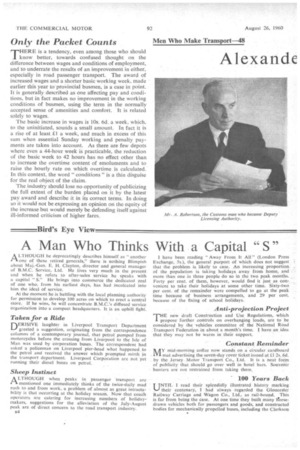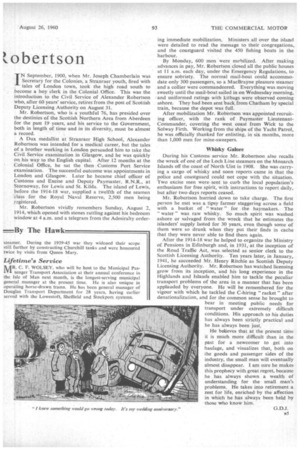Alexandc tobertson
Page 38

Page 39

If you've noticed an error in this article please click here to report it so we can fix it.
IN September, 1900, when Mr. Joseph Chamberlain was Secretary for the Colonies, a Stranraer youth, fired with tales of London town, took the high road south to become a boy clerk in the Colonial Office. This was the introduction to the Civil Service of Alexander Robertson who, after 60 years' service, retires from the post of Scottish Deputy Licensing Authority on August 31.
Mr. Robertson, who is a youthful 76, has presided over the destinies of the Scottish Northern Area from Aberdeen for the past 19 years, and his service to the Government, both in length of time and in its diversity, must be almost a record.
A Dux medallist at Stranraer High School, Alexander Robertson was intended for a medical career, but the tales of a brother working in London persuaded him to take the Civil Service examination in Glasgow, and he was quickly on his way to the English capital. After 12 months at the Colonial Office, he sat the then Customs Port Service examination. The successful outcome was appointments in London and Glasgow. Later he became chief officer of Customs and Excise and Deputy Paymaster, R.N.R., at Stornoway, for Lewis and St. Kilda. The island of Lewis, before the 1914-18 war, supplied a twelfth of the seamen class for the Royal Naval Reserve, 2,500 men being registered.
Mr. Robertson vividly remembers Sunday, August 2, 1914, which opened with stones rattling against his bedroom window at 4 a.m. and a telegram from the Admiralty order ing immediate mobilization, Ministers all over the island were detailed to read the message to their congregations, and the coastguard visited the 450 fishing boats in the harbour.
By Monday, 600 men were mobilized. After making advances in pay, Mr. Robertson closed all the public houses at 11 a.m. each day, under the Emergency Regulations, to ensure sobriety. The normal mail-boat could accommodate only 300 passengers, so a MacBrayne pleasure steamer and a collier were commandeered. Everything was moving sweetly until the mail-boat sailed in on Wednesday morning, and uniformed ratings with kitbags were observed coming ashore. They had been sent back from Chatham by special train, because the depot was full.
After mobilization Mr. Robertson was appointed recruiting officer, with the rank of Paymaster LieutenantCommander, covering the west coast from Wick to the Solway Firth. Working from the ships of the Yacht Patrol, he was officially thanked for enlisting, in six months, more than 1,000 men for mine-sweepers.
Whisky Galore During his Customs service Mr. Robertson also recalls the wreck of one of the Loch Line steamers on the Monarch Islands off the coast of North Uist in 1908. She was carrying a cargo of whisky and soon reports came in that the police and coastguard could not cope with the situation. Two excise men were sent to curb the local population's enthusiasm for free spirit, with instructions to report daily, but after two days reports ceased.
Mr. Robertson hurried down to take charge. The first person he met was a tipsy farmer staggering across a field with a bucket of " water " for the haymakers. The " water " was raw whisky. So much spirit was washed ashore or salvaged from the wreck that he estimates the islanders' supply lasted for 30 years, even though some of them were so drunk when they put their finds in cache that they were never able to find them again.
After the 1914-18 war he helped to organize the Ministry of Pensions in Edinburgh and, in 1931,at the inception of the Road Traffic Act, was selected as senior clerk to the Scottish Licensing Authority. Ten years later, in January, 1941, he succeeded Mr. Henry Ritchie as Scottish Deputy Licensing Authority. Mr. Robertson has watched licensing grow from its inception, and his long experience in the Highlands and Islands enabled him to tackle the peculiar transport problems of the area in a manner that has been applauded by everyone. He will be remembered for the vigour with which he tackled the C-hiring " racket " after denationalization, and for the common sense he brought to bear in meeting public needs for transport under extremely difficult conditions. His approach to his duties has always been strictly practical and he has always been just.
He believes that at the present time it is much more difficult than in the past for a newcomer to get into haulage, and visualizes that, both on
the goods and passenger sides of the industry, the small man will eventually almost disappear. I am sure he makes this prophecy with great regret, because he has always shown a wealth of understanding for the small man's problems. He takes into retirement a zest for life, enriched by the affection in which he has always been held by those who know him.




















































































































